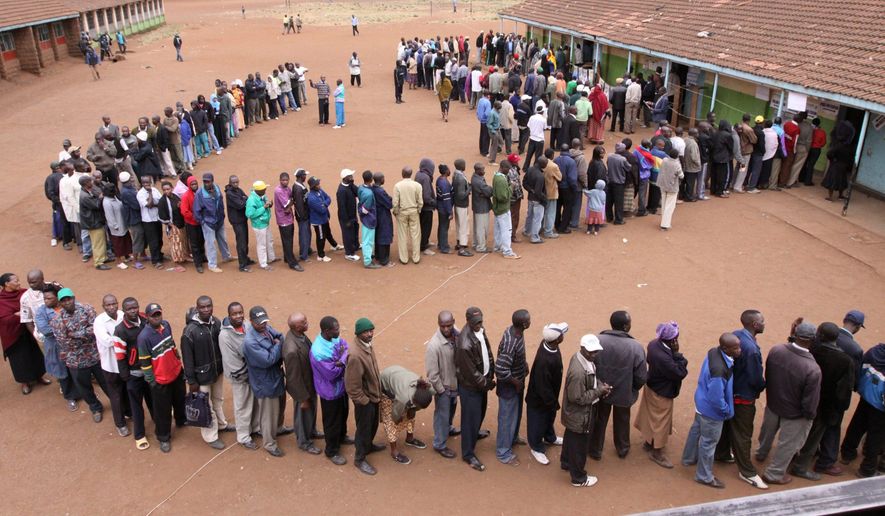TIMBOROA, Kenya | Enthusiastic voters, many wrapped in colorful traditional blankets, waited for hours Wednesday to cast ballots on a constitution that could spell a new era for Kenya — curtailing the president’s enormous powers and giving citizens a bill of rights.
With memories fresh in mind of the ethnically charged violence, which left more than 1,000 people dead after the disputed 2007 election, police were deployed en masse across the country.
Voters overwhelmed polling stations in some locations, and one Nairobi site saw dozens of Kenyans who had not yet voted force their way in after authorities tried to shut it down at the official 5 p.m. closing time.
Despite that after-hours push, officials reported few problems and no violence countrywide.
Enthusiasm for the new constitution appeared high. In the Nairobi slum of Kibera, lines formed as early as 3 a.m., while voters at some Rift Valley sites waited five hours or more.
“Since we got independence from Britain our country has not run smoothly. The current constitution has not been used well, but we didn’t write that one, and we are writing this one,” declared Paul Wahome, a 23-year-old student who waited six hours to vote in the Rift Valley town of Nakuru.
Returns from about 30 percent of the polling stations showed the “yes” camp taking an early lead: About 64 percent of the votes cast, compared to 36 percent for the “no” camp, according to Kenya’s election commissioner Ahmed Issack Hassan.
Pre-vote polls had showed the referendum would likely pass, and Associated Press reporters had difficulty finding Kenyans who said they voted against it.
“It’s a struggle between the haves and the have-nots in this country, and the haves are trying to maintain the status quo,” said James Otumba, a 43-year-old teacher who was shot in the chest during the 2007-08 violence.
“This is a revolution taking place in this country. … This constitution is one thing that can actually reconcile the nation,” he said.
The international community, and particularly the U.S., has urged Kenyans to pass the constitution, even as the draft raised emotions over land rights, abortion and Muslim family courts.
Kenya’s current constitution, drawn up in the lead-up to Kenya’s 1963 independence from Britain, grants the president sweeping powers.
State Department spokesman P.J. Crowley told reporters Wednesday the Obama administration was gratified that a large number of Kenyans voted and that the vote was generally peaceful.
“This is an important step toward strengthening democratic institutions in Kenya,” Mr. Crowley said.
If passed, the new constitution will dramatically cut back the president’s powers by setting up an American-style system of checks and balances and paving the way for much-needed land reform. Kenyan presidents have long favored their own ethnic tribes in the distribution of resources, a tremendous source of tension here.
This time around, the government changed voting procedures to avoid the charges of fraud that sullied the 2007 vote. Preliminary ballot results, for instance, were sent in to Nairobi by cell phones, and the tallying center was moved to a more isolated location to better control who has access to it.




Please read our comment policy before commenting.